Atheism And Consciousness
 From Conservapedia
From Conservapedia 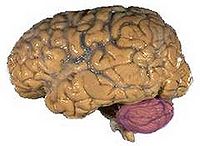
Consciousness is the quality or state of being aware.[1] To be conscious in the philosophical sense means to have mental processes that are self-directed [2] and which provide a locus of subjective experience.[3]
As far as atheism and consciousness, the atheist worldview cannot explain the existence of consciousness and the theistic worldview can offer a reasonable explanation.[4]
Advocates of mind uploading (Mind uploading is the notion that someday mankind may be able to scan and upload their minds to computer storage mediums) are generally strong advocates of cryonics as well.[5] Mind uploading is not a feasible hypothesis.[6] See also: Atheism and cryonics and Atheism and transhumanism
Contents
- 1 Atheism and the problem of consciousness
- 2 Christian apologetics and argument from consciousness for the existence of God
- 3 British atheists and their beliefs about the origins of human consciousness
- 4 The atheist Sam Harris on the problem of consciousness for an atheistic worldview
- 5 Atheist Luke Muehlhauser on human consciousness
- 6 Atheist John Horgan on consciousness
- 7 Scientific American quote of physicist Marcelo Gleisler on atheism and consciousness
- 8 See also
- 9 External links
- 10 Notes
Atheism and the problem of consciousness[edit]
- The Argument from Consciousness for the Existence of God by John Piippo
- Consciousness: One of Atheism's Irresolvable Problems by John Piippo
- Difficulties for Atheism: What is Consciousness
- The enigmatic human brain
- The human brain: The most complex structure in the universe
Christian apologetics and argument from consciousness for the existence of God[edit]
See also: Argument from consciousness and Atheism and reason
The argument from consciousness is an argument for the existence of God based on the problems consciousness poses for the atheistic worldview. The best-known defender of the argument from consciousness is the Christian apologist J.P. Moreland.[7] See: Argument from consciousness
John Piippo summarizes Moreland's argument from consciousness thusly:
| “ | J.P. is one of the best teachers I have ever encountered. His writing is crisp-clear. He's a brilliant thinker. He understands the relevant issues. Ultimately, this argument succeeds as an example of abductive reasoning:
|
” |
Other explanation of the argument from consciousness:
- Nature consists of a finite number of elements.
- We (our physical bodies) consist of those elements.
- The elements themselves which we consist of, and nature itself, have no consciousness.
- Despite our elements themselves having no consciousness, we do.
- Consciousness could not originate through blind natural forces, therefore there must be a being who supply that to us.
- Infinite regress of beings is illogical, therefore a single, uncaused causer must be the causer of consciousness.
- This uncaused causer of the conscience is God
British atheists and their beliefs about the origins of human consciousness[edit]
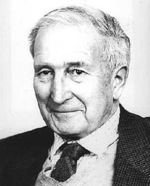
See also: British atheism and UK and secularism and Atheism and spirituality
In 2017, the Religion News Service reported about the British atheists and their beliefs about the origins of human consciousness:
| “ | ...even atheists do not find that evolution provides a satisfactory explanation for the development of human consciousness and the origins of what can be called spiritual aspects of human nature.
The results of the survey by the Centre for Science, Knowledge and Belief in Society, based at Newman University in Birmingham, and the survey organization YouGov were revealed at the British Science Festival in Brighton, West Sussex, on Tuesday (Sept. 5). It was part of a wider international research project called Science and Religion: Exploring the Spectrum funded by the Templeton Religion Trust.[10] |
” |
British ex-atheist Anthony Flew on the problem of consciousness for atheism[edit]
The British ex-atheist Anthony Flew in his book There is a God, points to the existence of consciousness as a problem for atheists.[11]
The atheist Sam Harris on the problem of consciousness for an atheistic worldview[edit]
See also: Atheism and personhood and Atheism and free will
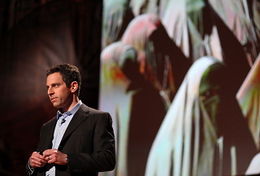
The new atheist Sam Harris wrote about consciousness:
| “ | Every feature of the human mind and body emerges over the course development: Why is consciousness more perplexing than language or digestion? The problem, however, is that the distance between unconsciousness and consciousness must be traversed in a single stride, if traversed at all. Just as the appearance of something out of nothing cannot be explained by our saying that the first something was “very small,” the birth of consciousness is rendered no less mysterious by saying that the simplest minds have only a glimmer of it.
This situation has been characterized as an “explanatory gap” and the “hard problem of consciousness,” and it is surely both. I am sympathetic with those who, like the philosopher Colin McGinn and the psychologist Steven Pinker, have judged the impasse to be total: Perhaps the emergence of consciousness is simply incomprehensible in human terms. Every chain of explanation must end somewhere—generally with a brute fact that neglects to explain itself. Consciousness might represent a terminus of this sort. Defying analysis, the mystery of inner life may one day cease to trouble us.[12] |
” |
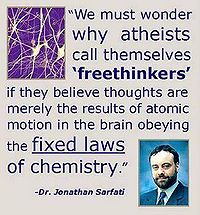
Harris stated about his position that the self is an illusion and a person's sense of self is illusion:
| “ | Illusions are experiences in the mind, but they are not out there in nature. Rather, they are events generated by the brain. Most of us have an experience of a self. I certainly have one, and I do not doubt that others do as well – an autonomous individual with a coherent identity and sense of free will. But that experience is an illusion – it does not exist independently of the person having the experience, and it is certainly not what it seems. That’s not to say that the illusion is pointless. Experiencing a self illusion may have tangible functional benefits in the way we think and act, but that does not mean that it exists as an entity.
I do not think there are many cognitive scientists who would doubt that the experience of I is constructed from a multitude of unconscious mechanisms and processes. Me is similarly constructed, though we may be more aware of the events that have shaped it over our lifetime... Answering the question of who is experiencing the illusion or interpreting the story is much more problematic. This is partly a conceptual problem and partly a problem of dualism. It is almost impossible to discuss the self without a referent in the same way that is difficult to think about a play without any players.[13] |
” |
See also: Sam Harris, atheism, freewill and determinism
Atheist Luke Muehlhauser on human consciousness[edit]

The atheist Luke Muehlhauser wrote on human consciousness:
| “ | I assume that some seemingly-core features of human conscious experience are illusions, and thus need to be “explained away” rather than “explained.”...
Similarly, I think some core features of consciousness are illusions, and the job of cognitive scientists is not to explain how those features are “real,” but rather to explain why they seem to us to be real (even though they’re not). For example, it seems to us that our conscious experiences have “intrinsic” properties beyond that which could ever be captured by a functional, mechanistic account of consciousness. I agree that our experiences seem to us to have this property, but I think this “seeming” is simply mistaken.[14] |
” |
Atheist John Horgan on consciousness[edit]
See also: Atheism and loneliness
The science journalist John Horgan is an atheist.[15]
John Horgan wrote about the topic of consciousness in Scientific American:
| “ | At the beginning of my book Mind-Body Problems, I describe one of my earliest childhood memories:
I am walking near a river on a hot summer day. My left hand grips a fishing rod, my right a can of worms. One friend walks in front of me, another behind. We’re headed to a spot on the river where we can catch perch, bullheads and large-mouth bass. Weeds bordering the path block my view of the river, but I can smell its dank breath and feel its chill on my skin. The seething of cicadas builds to a crescendo. I stop short. I’m me, I say. My friends don’t react, so I say, louder, I’m me. The friend before me glances over his shoulder and keeps walking, the friend behind pushes me. I resume walking, still thinking, I’m me, I’m me. I feel lonely, scared, exhilarated, bewildered... But I prefer my humble dualistic experience. It has left me with an abiding sense that the world is utterly weird, and the weirdest thing of all is that I’m here feeling the weirdness. It’s an unsettling feeling, but I cherish it.[16] |
” |
Scientific American quote of physicist Marcelo Gleisler on atheism and consciousness[edit]
See also: Atheism and science and Atheists and unreasonableness
The Scientific American in its article entitled Atheism Is Inconsistent with the Scientific Method, Prizewinning Physicist Says quotes Templeton Prize winning physicist Marcelo Gleiser declaring:
| “ | I honestly think atheism is inconsistent with the scientific method. What I mean by that is, what is atheism? It’s a statement, a categorical statement that expresses belief in nonbelief. “I don’t believe even though I have no evidence for or against, simply I don’t believe.” Period. It’s a declaration. But in science we don’t really do declarations. We say, “Okay, you can have a hypothesis, you have to have some evidence against or for that.”...
When you look out there at the other planets (and the exoplanets that we can make some sense of), when you look at the history of life on Earth, you will realize this place called Earth is absolutely amazing. And maybe, yes, there are others out there, possibly—who knows, we certainly expect so—but right now what we know is that we have this world, and we are these amazing molecular machines capable of self-awareness, and all that makes us very special indeed. And we know for a fact that there will be no other humans in the universe; there may be some humanoids somewhere out there, but we are unique products of our single, small planet’s long history.[17] |
” |
See also[edit]
- Atheism and the brain
- Atheism and critical thinking
- Atheism and knowledge
- Atheism and irrationality
- Atheism and logic
- Atheism and transhumanism
- Atheism and intelligence
External links[edit]
- How Consciousness Points to the Existence of God - Cold-Case Christianity with J. Warner Wallace
Notes[edit]
- ↑ https://www.merriam-webster.com/dictionary/consciousness
- ↑ http://books.google.co.uk/books?id=fDMNg2y9UN8C&pg=PA161&dq=consciousness+"self-directedness"
- ↑ http://www.consciousentities.com/bats.htm
- ↑ The Argument from Consciousness for the Existence of God by John Piippo, 3/20/2012
- Consciousness: One of Atheism's Irresolvable Problems by John Piippo, 4/14/2014
- ↑ Mind uploading - Thought experiments as knowledge
- ↑
- Against Naive Uploadism: Memory, Consciousness, and Synaptic Homeostasis, Seth Weisberg, H+ Magazine, May 6, 2011
- Why Transhumanism Won't Work, The New Atlantis, June 10, 2010
- Will we ever be able to upload our minds to a computer?
- You Might Never Upload Your Brain Into a Computer by George Dvorsky posted at 4/17/13 12:02pm at io9.com
- What's the Likelihood of the Singularity? Part Two: Uploading the Brain by Alex Knapp, Forbes, 6/24/2011
- ↑ The Argument from Consciousness for the Existence of God by John Piippo, 3/20/2012
- ↑ The Argument from Consciousness for the Existence of God by John Piippo, 3/20/2012
- ↑ The Argument from Consciousness for the Existence of God by John Piippo
- ↑ Britons reject creationism but some find evolutionary theory lacking, too
- ↑ The Argument from Consciousness for the Existence of God by John Piippo
- ↑ [THE MYSTERY OF CONSCIOUSNESS II] by Sam Harris
- ↑ THE ILLUSION OF THE SELF: An Interview with Bruce Hood, quote of Sam Harris
- ↑ 2017 Report on Consciousness and Moral Patienthood by Luke
- ↑ Why Stephen Hawking is Wrong About God Not Creating the Universe by Richard Deem
- ↑ The Dawn of Self-Consciousness: A sudden moment of self-awareness in childhood propels people on a quest to explore life’s mysteries by John Horgan, Scientific American
- ↑ Atheism Is Inconsistent with the Scientific Method, Prizewinning Physicist Says, Scientific American
Categories: [Atheism] [Philosophy] [Psychology] [Five Aggregates]
↧ Download as ZWI file | Last modified: 03/10/2023 09:33:25 | 17 views
☰ Source: https://www.conservapedia.com/Atheism_and_consciousness | License: CC BY-SA 3.0
 ZWI signed:
ZWI signed:

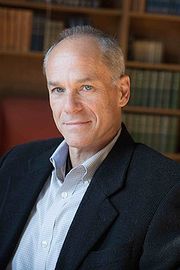
 KSF
KSF